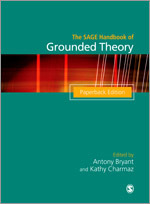
The SAGE Handbook of Grounded Theory
Paperback Edition
- Antony Bryant - Leeds Beckett University, UK, Professor of Informatics at Leeds Beckett University, UK
- Kathy Charmaz - Sonoma State University
Antony Bryant & Kathy Charmaz bring together leading researchers and practitioners of the method from the US, the UK, Australia and Europe to represent all the major standpoints within Grounded Theory, demonstrating the richness of the approach. The contributions cover a wide range of perspectives on the method, covering its features and ramifications, its intricacies in use, its demands on the skills and capabilities of the researcher and its position in the domain of research methods.
The SAGE Handbook of Grounded Theory is an indispensable reference source for academics and researchers across many disciplines who want to develop their understanding of the Grounded Theory method.
Besides the original readings by Anselm Strauss and Barney Glaser, this is the most comprehensive in-depth work on Grounded Theory. It contains a variety of excellent essays - from the very underlying epistemological foundations of Grounded Theory onto invaluable advice on how to best teach GT and employ it in fieldwork. A must-read for every researcher, lecturer, or student that wants to get a holistic understanding on what GT is about.
Great book for students who want more in-depth knowledge of grounded theory.
This book is ideal for post graduate students undertaking a research project using grounded theory
This book is an essential text for any student using a grounded theory methodology. The contributers provide a wealth of knowledge and experience to help the student to contextualise the use of GT in their own work.
Will support students deciding on their methodological approaches at masters level and above
One of my PhD students and one of the exchange students used Graounded theory for their research work and found this book very useful. Particularly with regard to identifying open and axial coding. They all used QSR NVivo for coding the data.
I am adopting this as a recommended resource for my Qualitative II course. Many students in the course are interested in grounded theory and for those students, I have recommended that they purchase this book and submit a reading response on a selection of chapters. I think the book is excellent and provides multiple perspectives.
The book is good but requires selective readers.
This book enable students to gain a good understanding of the application of Grounded Theory. It offers a clear, comprehensive discussion on the process from start to finish which helps to demystify this research methodology.
offers good overview of topic and is applicable to a wide range of users
I think this book is supplementary to the vourses that are given in qualitative reserach at this moment.







